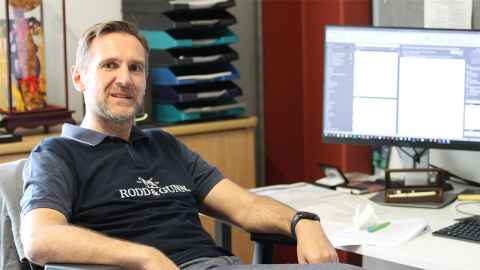Take 10 with... Christian Hartinger
Professor Christian Hartinger from the School of Chemical Sciences gives us 10 minutes of his time to discuss his research, which includes new metal-based anticancer drugs.

1. Describe your research topic to us in 10 words or less.
Medicinal and biological inorganic chemistry, and bioanalytical chemistry.
2. Now explain it in everyday terms!
My group focuses on the design of new metal-based anticancer drugs and we develop analytical methods to investigate their properties and targets in the biological environment. We are also interested in supramolecular chemistry where we aim to design compounds that respond to external stimuli and could be used, for example, for drug delivery.
More than fifty percent all cancer patients receive chemotherapeutics which contain the metal platinum. As for most (if not all) chemotherapeutics, cancer patients often experience side effects during treatment. We aim to develop compounds that show more selective activity in tumours and tumour cells over healthy tissue, and use metals such as ruthenium, rhodium, osmium, iridium and cobalt to build our new anticancer agents. With careful ligand design we equip our metal complexes with the desired biological properties to inhibit proteins overexpressed in cancer cells or to accumulate at tumour sites or in tumour cell compartments.
3. Describe some of your day-to-day research activities.
Unfortunately, these days I don’t have the time to go to the lab and run my own experiments. Most of the time I work in my office, often with one of my group members or a collaborator, and analyse data, write publications or draft new project proposals. The closest I come to a lab is when demonstrating CHEM320 in Semester One, which I absolutely enjoy!
4. What do you enjoy most about your research?
Unexpected discoveries! Research projects are full of surprises and if we can explain surprising discoveries or behaviour, this often means that we are on track to reveal something really exciting.
5. Tell us something that has surprised you in the course of your research.
I am again and again amazed what transition metals can do. They are already used for a wide range of applications. For example, they play important roles in medicine, as materials, and in catalysis and have so much more potential to explore. On a molecular level they tend to surprise us with their reactivity, and this is even elevated in presence of biological molecules.
6. How have you approached any challenges you’ve faced in your research?
A former PhD student of mine used to say 'if plan A doesn’t work, there are 25 other letters in the alphabet', and this is so true. Research requires a lot of perseverance and tenacity to overcome obstacles, but when they are overcome and we understand an observation or a process, it is the best feeling in the world.
7. What questions have emerged as a result?
Every surprising discovery opens up a new direction of research. Sometimes we have to be careful not to spread ourselves too thinly to be able to make impact on the international stage.
8. What kind of impact do you hope your research will have?
Eventually we hope that we will be able to develop anticancer compounds to successful clinical trials, so that patients can be treated with them. This is a very long process and therefore we appreciate and enjoy the successes we have on the road to the ultimate goal.
9. When you collaborate across the faculty or University, or outside the University, who do you work with and how does it benefit your research?
Being interested in drug design, I collaborate widely within the faculty and have also many cross-faculty, national and international collaborations. All collaborators bring complementary views, methods, and approaches which overall creates for many projects a synergistic effect, and we achieve more together than we would individually. I highly appreciate the input and contribution every collaborator makes to our joint research efforts.
10. What one piece of advice would you give your younger, less experienced research self?
For your publications, find a good balance between quality and quantity, build networks early and step out of your comfort zone!